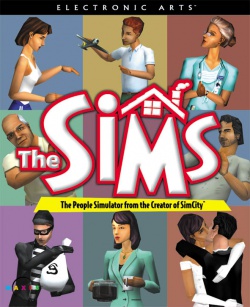Interview With Will Wright - Part 1
Happy Puppy interviews Will Wright!
Go to HappyPuppy.com, or click below to read part 1 of the interview!

Will Wright interview
by Avi Fryman and Libe Goad
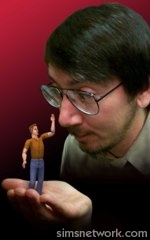 Will Wright, Maxis co-founder and chief designer, is for all purposes a gaming man of mystery. His SimCity and The Sims games have won numerous awards. He has been recognized on People's list of the most creative people in entertainment and by Time Digital as one of the most important people shaping technology. Yet, he still takes all of his own phone calls. There's no secretary shielding him from an adoring public, and if he's not there, you can simply leave a message on his voice mail, which, before this interview, gave us a first-hand look into the mind of Will Wright, the man.
Will Wright, Maxis co-founder and chief designer, is for all purposes a gaming man of mystery. His SimCity and The Sims games have won numerous awards. He has been recognized on People's list of the most creative people in entertainment and by Time Digital as one of the most important people shaping technology. Yet, he still takes all of his own phone calls. There's no secretary shielding him from an adoring public, and if he's not there, you can simply leave a message on his voice mail, which, before this interview, gave us a first-hand look into the mind of Will Wright, the man.
Ring, ring
"Hello? Is anyone there?" It's Will's voice.
"Uh, hi. This is Avi Fryman and Libe Goad from Happy Puppy…"
"Oh wait, I forgot. I'm not here," Will says.
We burst out in a nervous fit of laughter and continue introductions. On the other end, there's a strange silence.
"What kind of strange psychological game is this?" Avi thinks to himself.
"Dude," Libe pipes up. "I think that's his answering machine."
And so it was. Will calls us back, and before the interview begins, we already know he is a man who refuses to take himself too seriously. Following is the first half of our two-part interview with the self-dubbed "metaphorical cartographer."
Happy Puppy: When you introduced Miyamoto [at a press conference] at E3, you said that fun is "an ephimeral mist," and that "the more you try to grab at it, the more diffuse it is."
Will Wright: I said that? [laughs]
HP: You did. [laughter] And we consider you a pioneer of accessible gaming, so you obviously do have a grasp of it. How do you feel about that?
 WW: Um, I don't really feel that I have a grasp of it, that's for sure. I feel more like I blunder into it occasionally. It's just one of those things that you kind of throw patience at, and I am a patient person. You've got to try out a lot of different things, consider the results, do play tests. You know, you kind of develop an instinct for it. And you kind of head towards something that you think is going to be fun, and then you make a lot of mid-course corrections all the time. You never quite get to where you want to be, I think, but you'll always kind of have a sense of which direction is uphill, towards more fun. So when I'm working on a game, I always feel like I'm pushing the game toward that direction. And sometimes it gets very steep, and it's hard to keep going, but then it gets easier in some spots. And occasionally you get to a flat area and you're not quite sure which direction to go in and that's kind of the scariest part of creating a game. You can kind of push it or tune it in any direction, and it's not really clear which is the best. But I'm not quite sure how abstract you want me to get with this. I can get pretty abstract sometimes. [laughs]
WW: Um, I don't really feel that I have a grasp of it, that's for sure. I feel more like I blunder into it occasionally. It's just one of those things that you kind of throw patience at, and I am a patient person. You've got to try out a lot of different things, consider the results, do play tests. You know, you kind of develop an instinct for it. And you kind of head towards something that you think is going to be fun, and then you make a lot of mid-course corrections all the time. You never quite get to where you want to be, I think, but you'll always kind of have a sense of which direction is uphill, towards more fun. So when I'm working on a game, I always feel like I'm pushing the game toward that direction. And sometimes it gets very steep, and it's hard to keep going, but then it gets easier in some spots. And occasionally you get to a flat area and you're not quite sure which direction to go in and that's kind of the scariest part of creating a game. You can kind of push it or tune it in any direction, and it's not really clear which is the best. But I'm not quite sure how abstract you want me to get with this. I can get pretty abstract sometimes. [laughs]
HP: When you say you're pushing a game in a direction, are you pushing it towards greater accessibility or towards more fun?
WW: Well, the two are closely related. You know, if I give you the control panel for a 747 and you don't even know where to start, it's not going to be fun. So there has to be a certain level of accessibility. You have to understand a certain amount of what you're doing. Not completely. As soon as you completely understand what you're doing, it becomes quite boring. So it's kind of this fine balance between the two, where you understand a lot of what you're doing and how things work, but there are a few key variables that you're playing with, trying to explore or optimize or learn. The skills you learn in the game need to fall within the context of most of it being accessible and understandable.
HP: The person who introduced you prior to your introduction of Mr. Miyamoto at E3 said that the two of you have known each other for some time and that you had collaborated in the past. Is this the case, or are you currently collaborating on something?
 WW: In the past, when we first came out with SimCity, Miyamoto saw it, and was quite taken with it, and he wanted to have it on the Nintendo. This was back on the Super Nintendo, Super Famicom. And so they called us up and said that we want to do it, and they flew me out to Kyoto for a week, which I spent with him working on the redesign for that. Over the years we've kept in touch. Just about every time he's in town he gives me a call and we hang out.
WW: In the past, when we first came out with SimCity, Miyamoto saw it, and was quite taken with it, and he wanted to have it on the Nintendo. This was back on the Super Nintendo, Super Famicom. And so they called us up and said that we want to do it, and they flew me out to Kyoto for a week, which I spent with him working on the redesign for that. Over the years we've kept in touch. Just about every time he's in town he gives me a call and we hang out.
HP: Have there ever been any talks of you collaborating full-on with him on any new projects?
WW: Well, we're kind of in very different worlds, so not really. He's very tied to Nintendo and the cartridge side of things. We have talked about projects that we're working on over the years. I'm just kind of in awe of Miyamoto. He's like the guru on top of the mountain, you know?
What about Will and his PC?
 HP: Is your preference to work PC-specific, in general?
HP: Is your preference to work PC-specific, in general?
WW: Well, I guess I don't really think of it so much in those terms, but I want to work on the platform where I can be the most experimental. And that generally means some platform where there can be a lot of iteration and development and the costs aren't high. The cartridge market makes it harder to do experimental design because of the cost and development. And you're also dealing with unstable hardware, at the beginning, when things are first introduced, and they have kind of a very narrow market window. There's like one or two Christmases when these things really hit their peak before the next generation's coming out. So I think the PC for me feels like the more stable platform, over time. I can work on a game now that I know is not going to be ready for four years, and it's just a matter of me using more of the graphics power and CPU power. It's not a matter of everyone scrapping their PCs and buying a next generation PC which will render everything I've done useless. A lot of the projects I work on tend to be on fairly long time scales, relative to the majority of quality cartridge titles. Of course, Miyamoto is an exception. His projects tend to be relatively long time scale too. But of course, he's working on the hardware years before it's even released.
HP: What do you think about all the talk lately about whether or not PC gaming is going down?
WW: I think it's kind of an irrelevant argument. Whether the consoles start looking more like PCs or the PCs get more accessible like consoles, you know, I mean there's going to be some convergence between the two, but at least right now, for the foreseeable future, the PC is going to have a few advantages that I don't see the consoles coming anywhere near. Things like a high-res RBG monitor, mouse, and internet connectivity. There's a lot of things you can do on a PC that you're not going to conveniently do on a console. And vice versa too. So, no, I don't think the PC is dying.
HP: Where do you draw the majority of your inspiration from?
 WW: Mostly from reading. I read a lot. Mostly science, sociology, comics, history, but I would say primarily from reading science. I also like different design fields, like architecture and fine art design, industrial design.
WW: Mostly from reading. I read a lot. Mostly science, sociology, comics, history, but I would say primarily from reading science. I also like different design fields, like architecture and fine art design, industrial design.
HP: What have you been reading lately?
WW: Let's see. Right now I'm reading a book called, I think it's The Six Magic Numbers. It's about fundamental concepts of the universe, the way the universe works. I'm reading an architecture book, I forget the name of it. I'm reading a lot of astronomy books lately. I like reading physics and biology totally fascinates me. It's fascinated me for a long time.
HP: Did you study this stuff in college, or is it just a separate interest?
WW: Well, I've always been interested in a lot of different things, and that's kind of one of the reasons I think I ended up becoming a game designer. It's because I then have the excuse to study all of these subjects now, you know, whatever I want to. I can kind of pick what I want to learn and justify it as doing game research. I think about half the things I research I end up not making games out of. About half the games I make, I don't stop the research after I make the games. So I'm still reading books about city planning even though I'm kind of sick of SimCity. [laughs]
 HP: [laughter] In our research for this interview, we came across references to the Sim Mars project. What was that, and what happened to it?
HP: [laughter] In our research for this interview, we came across references to the Sim Mars project. What was that, and what happened to it?
WW: Well, it was really starting internally at Maxis. I wasn't really involved with it. At the time I was working on SimAnt. Some of the internal producers came up with this idea and we started working on it, thinking it would be interesting. It was supposed to be a fairly realistic simulation of the first exploration and then colonization of Mars. And so we had a lot of collaboration with NASA on it, using their actual conceptual drawings and plans for Mars. We had in fact originally planned to have the game released in time for the Pathfinder mission. No, it wasn't the Pathfinder. The next one, after that. The Mars Observer? Well, I forget what the other one was. But we thought it would be great if we had this game and it was released right in time for when this probe lands on Mars. Of course, that was one of the probes that failed miserably, so it's a good thing we didn't try to get the game out in time for the probe. But at some point, the people working on the game decided that it was kind of an interesting idea academically, but as a game it really wasn't going anywhere. And at that time also The Sims was really taking off, and so we took most of the team and then decided to ramp up most of our internal Sims projects.
Is space the place for The Sims? And will there be a SIMpsons game?
HP: Do you think The Sims will ever go to space?
WW: I wouldn't say it's unlikely. It's a possibility.
 HP: We're familiar with The Sims Online project that you're currently working on, which is really an expansion of the Sims' world. However, is there some macrocosmic way in which you plan to focus on a smaller element of the Sims' world, much in the way that SimCity was inspired by your experiences with level building in Raid on Bungeling Bay, and The Sims was then a macrocosmic expansion of SimCity? In other words, is there some element of The Sims that you feel you might focus on further, in a smaller sense?
HP: We're familiar with The Sims Online project that you're currently working on, which is really an expansion of the Sims' world. However, is there some macrocosmic way in which you plan to focus on a smaller element of the Sims' world, much in the way that SimCity was inspired by your experiences with level building in Raid on Bungeling Bay, and The Sims was then a macrocosmic expansion of SimCity? In other words, is there some element of The Sims that you feel you might focus on further, in a smaller sense?
WW: That's a very good question. You know, I don't think in that context, of The Sims' world, but in other contexts, yes. I'm playing around with some ideas now, a brand new project, and I'm not ready to talk about it, but it would involve something like that. As far as The Sims, we kind of pick the level we're dealing within. In some sense, The Sims 2 will be much closer in on the Sims. Much more in their face. They should seem much more detailed and real as you get much closer to them, so it'll have a little bit of that.
HP: We heard that you're not involved in the development of SimsVille. Why not?
WW: Well, you know, I've only got so much time.
HP: There's not like two or three of you? Some clones running around?
WW: Well, right now the Sims franchise is keeping me very busy. There's so many opportunities. There's so many things we could do with it, but it's dangerous to think in those terms, and trying to explore all the things we could do with it. We're at the point where usually these kinds of things spin out of control and get totally diluted. And what we really have to do at that point is focus on maybe two, or three at the most, things we're going to do with this franchise and we're going to do those well, as opposed to trying to do everything you can.
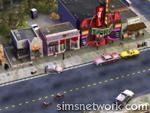 HP: What do you think about SimsVille?
HP: What do you think about SimsVille?
WW: I think it's very interesting. It's still going through a lot of design evolution. And in fact, I do talk to the designer every other day. Christine McGavran, she's the one who worked on Sim City 3000. I think the question with SimsVille is turning out to be what exactly is the focus of the game. How close is it to The Sims versus SimCity? And it's kind of between the two. And it kind of feels like it wants to be a little bit more one way or the other. But this is in very fine shadings of game tuning. The degree of latitude we're talking about here is actually quite minor. When it comes to tuning the game and getting inside of the player's head, it's actually a very crucial question.
HP: Do you know what makes the Sims games so addictive?
WW: I think for different people, it's different things. I know for me, and for a lot of people, it's the creativity. The fact that this a world that you can be fairly creative in. You know, either in terms of what you build or what you're designing, or in terms of what you play out. What type of story or situation that you kind of construct. But it's kind of creativity then meshed with this kind of serendipitous non-linear surprise aspect. So you've designed this thing, and you run it, and all of a sudden you see things that are plausible, but not what you expected. So you're kind of playing with chaos in a way. It's like this little chaos toy that you're playing with in your hand and occasionally it just turns purple. And you didn't expect it to turn purple. But then you think back on it and say, oh yeah, it makes sense that it turned purple.
 HP: As you said, there are only so many directions that you can take the franchise. But would you ever consider a joint-venture license, such as something that would incorporate The Simpsons? So that it would be the SIMpsons? That's the million-dollar idea of our assistant editor Gabe.
HP: As you said, there are only so many directions that you can take the franchise. But would you ever consider a joint-venture license, such as something that would incorporate The Simpsons? So that it would be the SIMpsons? That's the million-dollar idea of our assistant editor Gabe.
WW: That's come up a couple of times. This is kind of a larger business question. In general, with a company like us, we're much better off trying to develop our own intellectual property rather than trying to leverage off of someone else's intellectual property. Especially once we've gotten through the filters in distribution. So if we had a little game and it wasn't terribly remarkable, and we couldn't get distributors as excited about it, then the value of a Simpsons license would be tremendous. It could literally make or break our game. But on the other hand, if we have a game that's already going out there and doing great numbers, then internally it doesn't really make sense to be investing time and energy in something that's somebody else's intellectual property. We'd rather be spending that time building our intellectual property, which we can then leverage out against different formats. So that's kind of my boring, dry business answer.
HP: Someone could create a skin for The Simpsons anyway, I guess.
WW: Yeah, fans do that all the time, of course.
Are there loving AI bots in our future?
HP: Have you seen any user-created skins that you really thought were amazing?
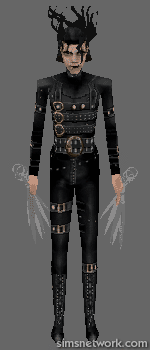 WW: All the time, yeah. There's a site called Dr. Frankensim. Some of the skins are amazing. But not only the skins...they're doing the full meshes and everything. So they do things like Edward Scissorhands. And it's just perfect in every detail. Even when he takes his clothes off, you can see where his body parts are sewn together. I mean, they're just amazing. The artists who lavish time on these things. And then other people are making these really cool stories that are up on our website. You know, we have this Sims Exchange thing. And it's just amazing how much people lavish on these stories. There's one where this woman's husband is a mad scientist and he makes this weird device, and then one day he's away and she goes into his lab to play with the device. And all of a sudden she gets popped into the real world. And they actually recreated the whole family and the house and everything, like in 3D Max or something. And so there's a whole 3D version of this character walking around the same house. And then she goes and turns on the computer and she sees him in the sim world again, crying because he can't find her. And then she feels bad, and she finds a way to go back to the vortex and back to the sim world. And it's just amazing that somebody took the time to do this.
WW: All the time, yeah. There's a site called Dr. Frankensim. Some of the skins are amazing. But not only the skins...they're doing the full meshes and everything. So they do things like Edward Scissorhands. And it's just perfect in every detail. Even when he takes his clothes off, you can see where his body parts are sewn together. I mean, they're just amazing. The artists who lavish time on these things. And then other people are making these really cool stories that are up on our website. You know, we have this Sims Exchange thing. And it's just amazing how much people lavish on these stories. There's one where this woman's husband is a mad scientist and he makes this weird device, and then one day he's away and she goes into his lab to play with the device. And all of a sudden she gets popped into the real world. And they actually recreated the whole family and the house and everything, like in 3D Max or something. And so there's a whole 3D version of this character walking around the same house. And then she goes and turns on the computer and she sees him in the sim world again, crying because he can't find her. And then she feels bad, and she finds a way to go back to the vortex and back to the sim world. And it's just amazing that somebody took the time to do this.
HP: What is your take on the evolution of artificial intelligence? And have you seen A.I.?
WW: Yeah, I did. I liked it a lot. Although the AI part didn't seem terribly reasonable to me. But I really enjoyed the movie, except for the middle part. I think they could have cut out the entire middle part and it would have been a better movie.
HP: Well, do you see artificial intelligence taking on more and more human characteristics over the course of time, or do you see it moving in another direction?
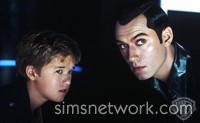 WW: I see it moving in another direction. I mean, I think artificial intelligence will have the ability to mimic human behavior, but that's not going to be its natural thought process. I think that eventually, and this might be 50 years down the road, maybe 100, where we get human-level mechanical intelligence. I don't think it's going to think like us at all. I think there's a very large space of possible minds and the chances are that whatever minds we eventually evolve in a computer will be dramatically different, both in form and function, from ours. We tend to have this circuit in our brain that wants to map our empathy onto inanimate objects. So you know, we tend to want to ascribe human intents and desires, and emotions to intelligent machines. But in fact, I don't think they're going to have the same motivations or emotions or intents as we do. They're going to be absolutely inscrutable. They're going to be very alien. I think the first aliens we meet, in fact, are going to be the ones we invent.
WW: I see it moving in another direction. I mean, I think artificial intelligence will have the ability to mimic human behavior, but that's not going to be its natural thought process. I think that eventually, and this might be 50 years down the road, maybe 100, where we get human-level mechanical intelligence. I don't think it's going to think like us at all. I think there's a very large space of possible minds and the chances are that whatever minds we eventually evolve in a computer will be dramatically different, both in form and function, from ours. We tend to have this circuit in our brain that wants to map our empathy onto inanimate objects. So you know, we tend to want to ascribe human intents and desires, and emotions to intelligent machines. But in fact, I don't think they're going to have the same motivations or emotions or intents as we do. They're going to be absolutely inscrutable. They're going to be very alien. I think the first aliens we meet, in fact, are going to be the ones we invent.
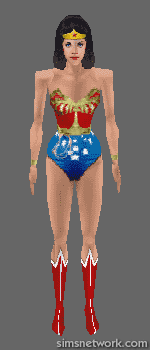 HP: Right now the Sims are sort of pared down so that the user can insert part of themselves into the Sims experience. Do you think that at any point you'll try to give your Sims more human characteristics?
HP: Right now the Sims are sort of pared down so that the user can insert part of themselves into the Sims experience. Do you think that at any point you'll try to give your Sims more human characteristics?
WW: Well, there are two aspects to this. There is building something that is artificially intelligent. You know, sitting there and making a lot of interesting behavioral decisions and actually getting by in its environment. And then there is the trick of getting people to think that what they see is an intelligent agent, acting like a human. They're actually very different things. One of them is kind of like magic, where I'm pulling the wool over your eyes and saying, "Look at all of these little people. They're real." The other one is actually trying to create something that in fact has a pretty large behavioral space. In fact, I find both of those activities very fascinating. And I look forward to pursuing both of those in the future, both trying to create intelligent mechanical intelligences, and figuring out how to get people to empathize with these artifacts on the screen. But I feel like they're very different things. But they come together in The Sims, you know, we're kind of doing both. They do have a fair amount of intelligent behavior that they have to exhibit. At the same time, we also want you to think that they're actually feeling sad or happy or mad, and having these emotions that they don't really have. So yeah, I see myself pursuing that.















